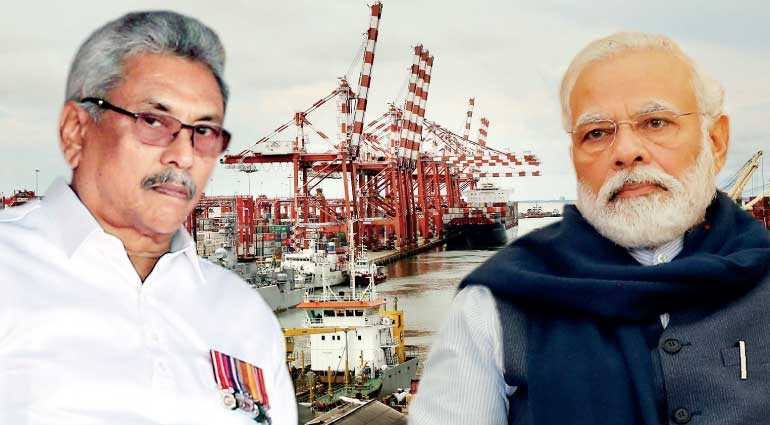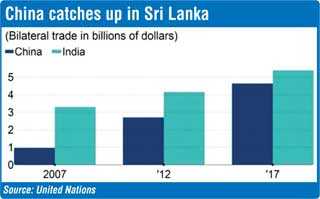Wednesday Feb 18, 2026
Wednesday Feb 18, 2026
Monday, 13 July 2020 00:20 - - {{hitsCtrl.values.hits}}

Sri Lankan President Rajapaksa (left) has appointed a committee to examine concerns about the East Container Terminal project at Colombo Port. Critics charge the project is an attempt to distance Sri Lanka from India, led by Prime Minister Modi - AP
By Munza Mushtaq
asia.nikkei.com: Sri Lanka’s strong ties with neighbouring India are being tested after President Gotabaya Rajapaksa announced that his government is reviewing a port deal worth millions of dollars that was signed between the previous Sirisena government and New Delhi.
Political observers say the move is the latest effort by Rajapaksa to distance himself from grants and other funding offered by the ‘Quad’ nations – the US, India, Japan and Australia – which are trying to counter China’s growing geopolitical influence. Sri Lanka’s government recently shelved the Japan-funded Colombo Light Railway project and a $ 480 million Millennium Challenge Corporation grant from the US.
Workers at Colombo Port, which handles more than 7 million twenty-foot equivalent units of cargo annually, are demanding that the government scrap the agreement, which authorises India and Japan to develop the new East Container Terminal. The port workers want guarantees that the project will be fully owned by the Sri Lanka Ports Authority, a government entity.
Trade unions say the project threatens to cede ownership of the ECT to India. Prime Minister Mahinda Rajapaksa, a former president and elder brother of the incumbent, said there is “no final agreement” with regard to the project, although the previous government signed a memorandum of cooperation with India and Japan May 2019 to develop the ECT. The terms of the deal gave Sri Lanka a 51% stake, with India and Japan holding the rest. The project was estimated to cost between $ 500 million and $ 700 million.
A representative of the Indian High Commission in Colombo said that about two-thirds of Sri Lanka’s international cargo traffic is with India. “There are opportunities for win-win cooperation among India, Sri Lanka and Japan in developing the ECT to promote prosperity in our maritime region.”
But Shyamal Sumanarathna, secretary of the Ports, Commerce Industries and Progressive Workers Union is adamant that India’s stake be curbed. “We heard that there is a lot of pressure from India over this project. But we are not a province of India, we are a sovereign nation and we do not need to dance to their tunes,” Sumanarathna told the Nikkei Asian Review, adding, “Following our strike, the prime minister assured [us] that he will sort this issue out.”
He warned that the union, which is affiliated to President Rajapaksa’s political party, was ready to oppose the government if the project goes ahead. “We can always elect [the party] back, but if the ECT is given to India, we will never get it back. The ECT should be controlled 100% by SLPA and not by a foreign country,” Sumanarathna said.
Responding to the union’s demands, Rajapaksa last week appointed a five-member committee to examine and report on concerns over the ECT. The committee has 45 days to report back and recommend steps to ensure the terminal delivers the maximum benefit for Sri Lanka.
However, Rohan Masakorala, a maritime shipping expert and CEO of the Shippers Academy Colombo, points out that most modern ports have both international and national partners. He believes the ECT should proceed, saying, “It will also help us to compete better in the long run.”
Masakorala disputed the trade unions’ claims, calling them “nationalistic” and arguing that their statements are made by people who do not understand global business, or are politically motivated. Masakorala also expressed surprise at their position because the Colombo Port already has international partners and local companies running terminals efficiently.
“South Asia Gateway Terminal has been running for over 20 years with a number of international partners, and similarly the Colombo International Container Terminal has been operating for seven years with a Chinese company,” he said.
Since the COVID-19 pandemic, which put Sri Lanka in lockdown for over two months, President Rajapaksa has turned to China several times for bailouts as the country tries to extricate itself from a financial crisis.
Harin Fernando, a minister in the previous government led by Maithripala Sirisena and Prime Minister Ranil Wickremesinghe, accused the current administration of turning Sri Lanka into a ‘banana republic’ under Chinese rule.
“In 2014, before we toppled the government, this is what we highlighted. But now we see [the Chinese] doing this much more strategically,” he told Nikkei.
Fernando said China now has a complete monopoly on Sri Lanka’s development projects and that Sri Lanka is “under debt” to China. He added that many dealings with China in the past lacked transparency and failed to follow due tender procedure, while the public was often kept in the dark. (Source: https://asia.nikkei.com/Politics/International-relations/Sri-Lanka-s-India-ties-strained-as-Rajapaksa-rethinks-port-deal)